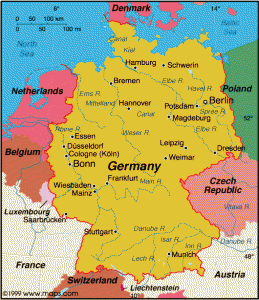From the past couple of years there has been increased fear and restlessness among the investors regarding the euro crisis which is basically rose out of the rising government debts in some of the European states. This has caused widespread distress and affected economies all round the world, with rescue packages worth hundreds of billions of Euros also not sufficing the cause. With countries being adversely especially the ones in the euro zone, the scenario seems to be really gloomy. But the country I would be bringing in the purview here has been doing quite well even when most of its counterparts are facing the heat of the crisis. I am analyzing here the economy of the powerhouse of Europe that is Germany. The Germans have taken the lead in trying to pull their European Union partners out of the abyss, but the cost is still unknown and success very much uncertain. Germans are feeling less then favorable toward the euro and the EU, and believe the bad news will continue. But when it comes to their own country, they are more optimistic. In 2011, the number of unemployed in Germany fell to an average of 2.98 million workers, the lowest level in two decades.

In a survey conducted by the Allensbach Institute at the end of last year, roughly half of Germans said they were looking toward 2012 with hope, while another 17 per cent said they had concerns, and the remaining 26 per cent were skeptical. So far, though, Germans have suffered little to no impact from the debt crisis. Germany is certainly one of the “haves” among the EU’s 17 members, which is why it is driving bailout efforts to stabilize the “have nots” such as Greece, first through the European Financial Stability Facility and then the European Stability Mechanism. That blithe spirit has aroused the resentment of Germany’s neighbors and the fear of economists around the world. Germany’s export-oriented economy is humming along. The unemployment rate is at its lowest in 20 years. The business confidence index released this week by the Munich-based Ifo Institute posted its biggest gains since February. Consumer spending continued to rise last quarter, and chain stores reported strong sales in the weeks before Christmas. Germany’s leaders have pushed for tighter budgetary controls on its wayward neighbors and greater fiscal unity in the Euro zone. Germany had its first negative quarter since 2009 with a decline of 0.2%, compared with the previous quarter. For 2011 as a whole, the German economy grew by 3%. According to the Allensbach Institute, which has tracked these things rigorously since 1949, 49% polled said they were hopeful of the future, compared with 17% who were fearful. That’s pretty well three smiles to every frown (with 26% showing some skepticism and 8% undecided).
So what’s behind the robustness and buffer from international disturbances? China, in a word. And “manufacturing”, in another. The growth of China is fuelling demand by the Chinese new rich for BMWs and demand by Chinese factories for German machinery. This isn’t a fluke. German industrialists foresaw the potential of China when most others saw only turbulence and trouble. In October 1975 – 37 years ago, when China was in the chaos of the Cultural Revolution – the Financial Times described German policy towards the country: “China could be the next growth market”. The image which Germany is trying to project in the largest and most populous developing country in the world is not that of a major political power, but rather of the most important industrial country in the world, a country whose tool-making and mechanical engineering can compete successfully on the world market. In 1975, British industry was in its perpetual state of crisis at the time, gearing up for what would be the general strike of the Winter of Discontent. The US economy was in recession. But German industrialists were thinking of China as the future.
A large part of German industry is family-owned, the short-term demands of shareholders, who want quick and relentless rises in the prices of shares, do not matter.Many German firms, too, are owned by “foundations”, often set up by the company’s first generation of family founders. If you go to virtually any German small town, there is a good chance that on the outskirts will be a middle-sized family firm which, in its own field, will be in the top three in the world. So it this entrepreneurial spirit and constant innovation which gives the country edge over the rest of the euro zone nations. Another important factor which contributes to the industrial growth of Germany is the cheap workforce. In 2010 the German Federal Statistics Office reported that private sector wages had only increased by 21.8 percent between 2000 and 2010, compared to 35.5 percent for the European Union as a whole. And when one considers real wages, it reveals stagnation, with an actual decline recorded between 2004 and 2008. High savings rates, lack of credit card use, though German debt as a whole is around 83% of GDP. So aversion to debt but debt exists. Unlike much of Europe, tax collections make up much of the difference.
If we now bring into picture the euro crisis then Germany is one of the nations which is expected to pull the other countries out of this crisis because of its strong foothold in the world economy but right now any initiative to bail out Europe will not pass the general public. If the US treasury lends to the US government it has reason to believe the government will do its best to pay it back, as both entities pursue a common goal of a peaceful and prosperous US. If the ECB lends to euro area sovereigns or some proxy such as the European Financial Stability Facility, it has no such assurance. The recent in Greece and Italy would only make you more convinced that domestic imperatives will trump the obligation to repay the ECB in some countries, leaving the better-off countries to cover their liabilities. For better-off countries, read German taxpayers. This is why Germany and the ECB may be forced to play a game of chicken with countries like Italy. More than 60% of Germans oppose the latest Greek rescue and believe Greece can’t be saved from going bankrupt, according to a survey by Emnid, a German polling firm, released on Sunday. Europeans may call for German leadership, but they don’t want to be led by Germany. And they certainly don’t like the results of German leadership. When a European Union task force, led by a German, traveled to Athens in October to offer technical assistance with economic reforms, some disgruntled Greeks soon called its members “the Gauleiters” the term for Nazi-era regional government representatives.
With the situation of the crisis worsening every day, Germany can’t play the silent game anymore as Sikorski’s speech sometime back said he fears German inaction more than German power was incredibly important. Germany will have to take some stringent measures to ensure the maximum good rather than just its own prudence and its needs show some sodality to the affected euro zone countries because these were the ones who stood by her side in the past.
[The article has been written by Sidhant Srivastava. He is a Mechanical Engineer from IIT Ropar.]
You might like reading:

Casino Royale : Goa, Cash and Gambling !
Are you sure you are playing a game and not gambling? The difference between gaming and gambling is quite simple: Gambling that is legalised is regarded as a game. For instance, betting on Cricket match results is considered as a gambling activity in India while the same is legal in UK. At present Casinos are allowed in only two Indian […]

Xavier University Bhubaneswar, Celebrates Convocation at XIMB Campus
Xavier University, Bhubaneswar (XUB), one of the leading private universities of India celebrated the 2nd convocation ceremony. A batch of 578 students graduated from various programmes of MBA in Business management, Rural Management, Human Resource, Part Time MBA and Mass Media Journalism &Communications. Welcoming the guests, faculties and students, Prof. Dr. Fr. Paul Fernandes S.J., Vice-Chancellor & Director XUB, in his […]































